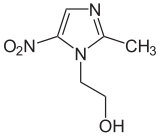Metronidazole is an antibiotic and antiprotozoal medication. It is used either alone or with other antibiotics to treat pelvic inflammatory disease, endocarditis, and bacterial vaginosis. It is effective for dracunculiasis, giardiasis, trichomoniasis, and amebiasis.
Molecular Structure |

Class of Drug |
Antibacterial, Antiprotozoan, Amebicide.
Mechanism of Action |
Inhibits nucleic acid synthesis and disrupts DNA structure. Causes loss of helical DNA structure and breakage of DNA strands.
Susceptible organisms in vivo: Anaerobes: Bacteroides fragilis and DOT group. Fusobacterium, Clostridium species including C. difficile; Proprionibacterium acne and Actinomyces are not susceptible. Also, Treponema pallidum, oral spirochetes, Campylobacter fetus, Gardnerella vaginalis, Helicobacter pylori. Parasites: Trichomonas vaginalis, Giardia lamblia, Entamoeba histolytica.
Indications / Dosage / Route |
Routes of Administration: Oral and IV.
Condition: Intestinal Amebiasis
Dose: Adults: PO 750 mg t.i.d., 5-10 days.
Note: It is recommended that iodoquinol be added at a dosage of 650 mg PO t.i.d. for 20 days for infection or abscess or both.
Condition: Amoebic hepatic abscess
Dose: Adults: PO 500-750 mg t.i.d., 5-10 days.
Children: PO 35-50 mg/kg/d (divided in 3 doses), 10 days.
Condition: Trichomonas infections
Dose: Adults: PO 350 mg b.i.d. for 7 days or PO 2g b.i.d.
Condition: Infections caused by anaerobic microorganisms
Dose: Adults: IV, Oral 500 mg q6-8h. Maximum: 4 g/d.
Children: IV 7.5 mg/kg q6h. Maximum: 4 g/d.
Condition: Prophylaxis of postoperative infection
Dose: Adults IV 15 mg/kg, infused 30-60 minutes, completed 1 hour before surgery; then 7.5 mg/kg infused 30-60 minutes, 6-12 hours after initial dose.
Condition: Clostridium difficile
Dose: Adults: PO 750-2000 mg/d, 3-1 divided doses, 7-14 days.
Condition: Helicobacter pylori: associated with peptic ulcer
Dose: Adults: PO 250-500 mg t.i.d. in combination with bismuth subsalicylate 525 mg and tetracycline 500 mg q.i.d. Other combinations anticipated.
Children: PO 15-20 mg/kg/d, divided in 2 doses, 4 weeks, combine with bismuth subsalicylate and amoxicillin. Other combinations anticipated.
Adjustment of Dosage |
Kidney disease: Creatinine clearance < 10 mL/min: reduce dose by 50%. Administer after dialysis.
Liver disease: Mild: no change in dose. Severe: reduce dose.
Elderly: Prone to intolerance, use lower doses.
Pediatric: Neonates require lower doses than infants and children. Safety and efficacy in children have not been established except in treatment of amebiasis.
Food and Drug Interactions |
Food: Take drug with food or milk.
Pregnancy: Category B. Considered contraindicated in the first trimester of pregnancy when used for trichomoniasis.
Lactation: Appears in breast milk. Potentially mutagenic. American Academy of Pediatrics recommends caution with use. Patient should discontinue breastfeeding for 12-24 hours after single 2-g dose.
Contraindications: Hypersensitivity to metronidazole.
Warnings / Precautions |
> Use with caution in patients with alco¬holism, kidney disease, severe hepatic disease, CHF, blood dyscrasias, CNS infections, retinal visual field problems, seizures or neurologic problems, predisposition to edema (IV preparation).
Clinically Important Drug Interactions |
> Drugs that decrease effects/toxicity of metronidazole: barbitu-rates, phenytoin.
> Metronidazole increases effects/toxicity of oral anticoagulants, hydantoins, cimetidine, astemizole, lithium, phenytoin, and alcohol (disulfiram-like reaction).
> Drug that increases effects/toxicity of metronidazole: cimetidine.
Adverse Reactions |
> Common: headache, abdominal pain, anorexia, dizziness, vomiting.
> Serious: seizures, peripheral neuropathy, pancreatitis, leukopenia, ataxia.
Parameters to Monitor |
> Signs and symptoms of neuropathy.
> Use of yogurt (4 oz/d) may be helpful in prevention of super-infection.
> Differential leukocyte counts before and after therapy.
Advice to Patient |
> Avoid driving and other activities requiring mental alertness or that are potentially dangerous until response to drug is known.
> Use OTC medications only if approved by the treating physician.
> If treated for trichomioniasis, abstain from intercourse or use barrier protection to prevent reinfection.
> Do not use alcohol for 72 hours after discontinuing therapy.
Further Useful Info |
> Off-label use of metronidazole includes treatment of Crohn’s disease, especially with fistulization. Doses of 20 mg/kg/d for 3 months have been shown to prevent recurrence of Crohn’s disease following ileal resection.
> Peripheral neuropathy developing with long-term use may be irreversible.


